Unit 8 It must belong to Carla Section A3 (Grammar focus-4c) 优学案(含答案)
文档属性
| 名称 | Unit 8 It must belong to Carla Section A3 (Grammar focus-4c) 优学案(含答案) | 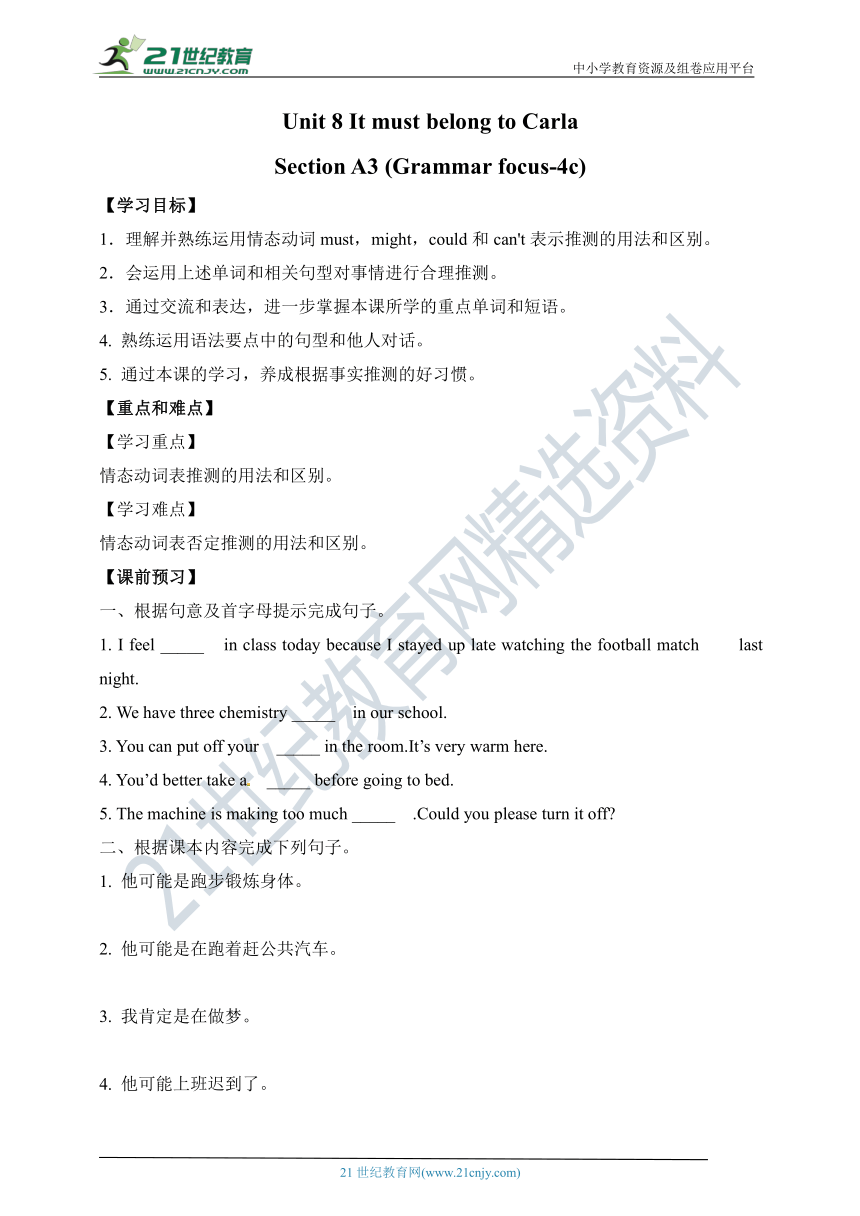 | |
| 格式 | zip | ||
| 文件大小 | 1.1MB | ||
| 资源类型 | 试卷 | ||
| 版本资源 | 人教新目标(Go for it)版 | ||
| 科目 | 英语 | ||
| 更新时间 | 2019-08-13 11:11:48 | ||
图片预览

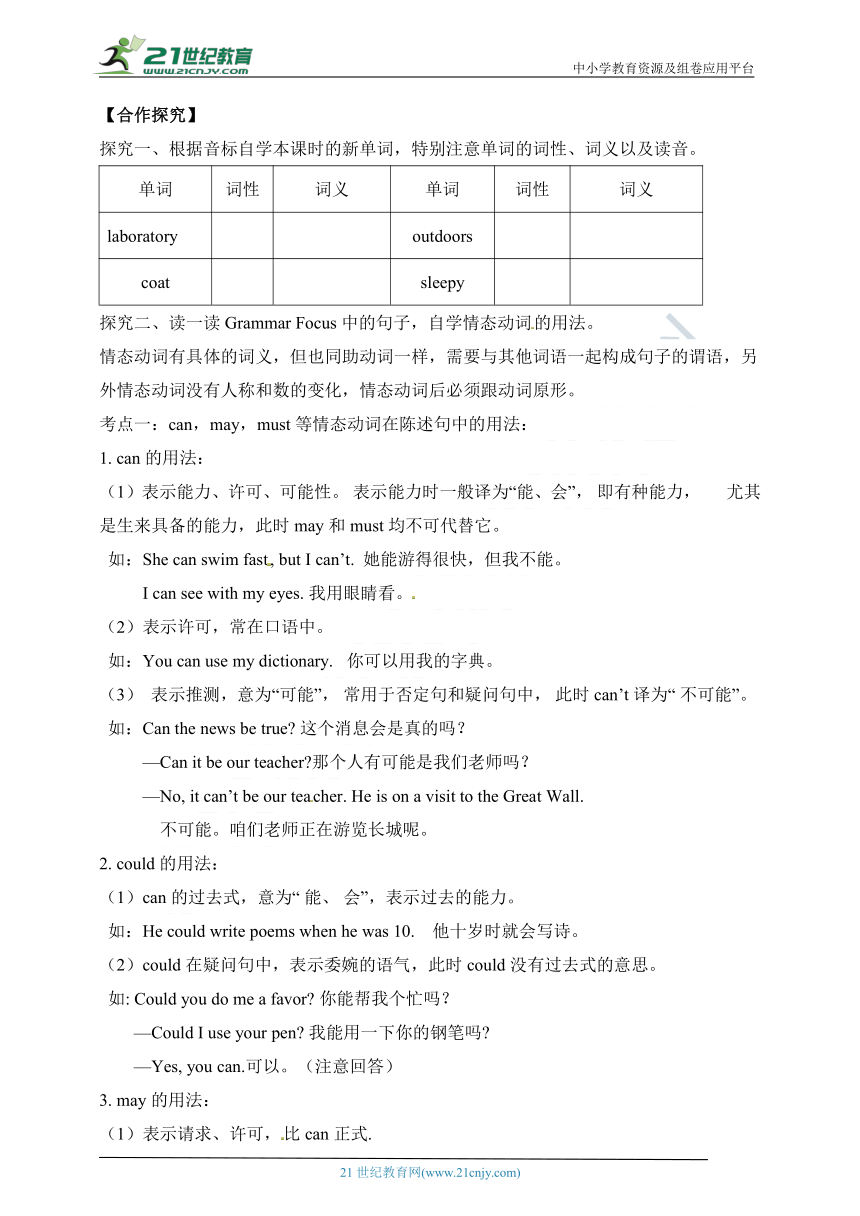
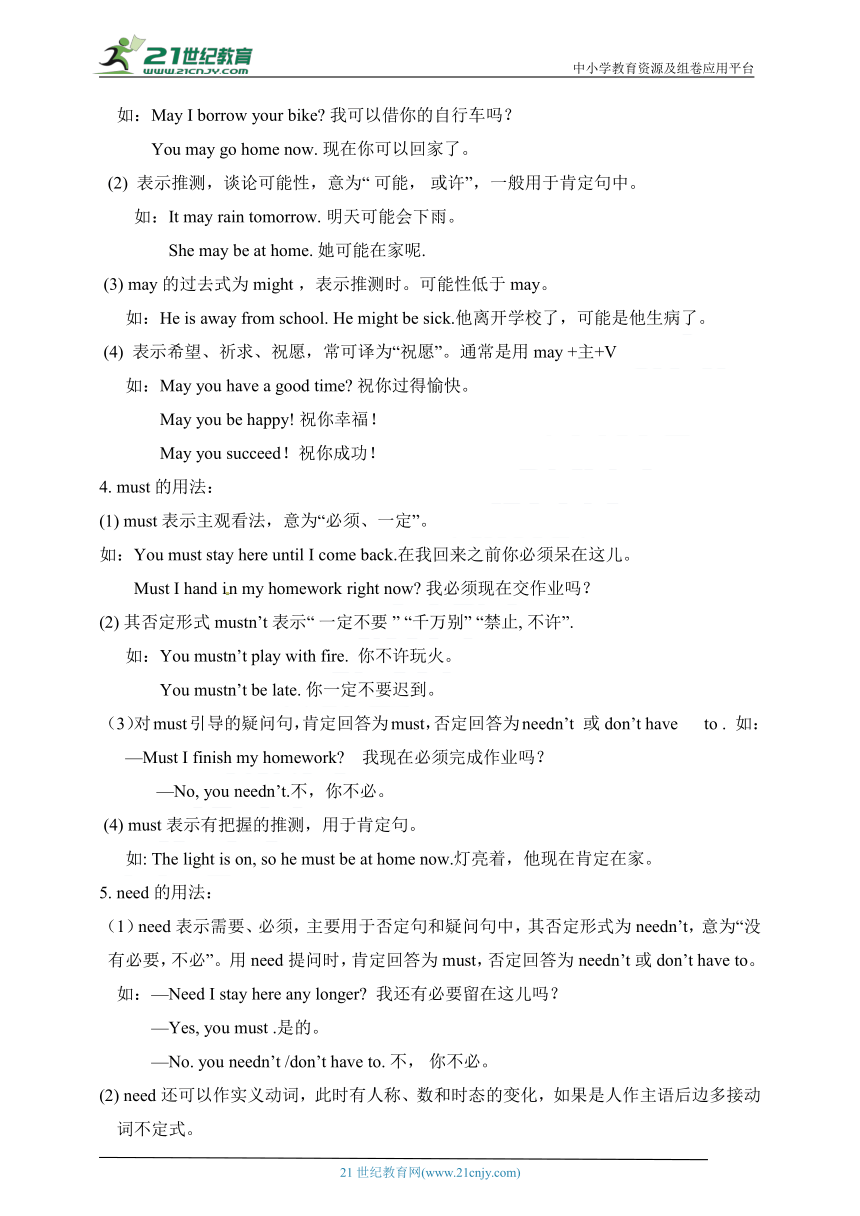
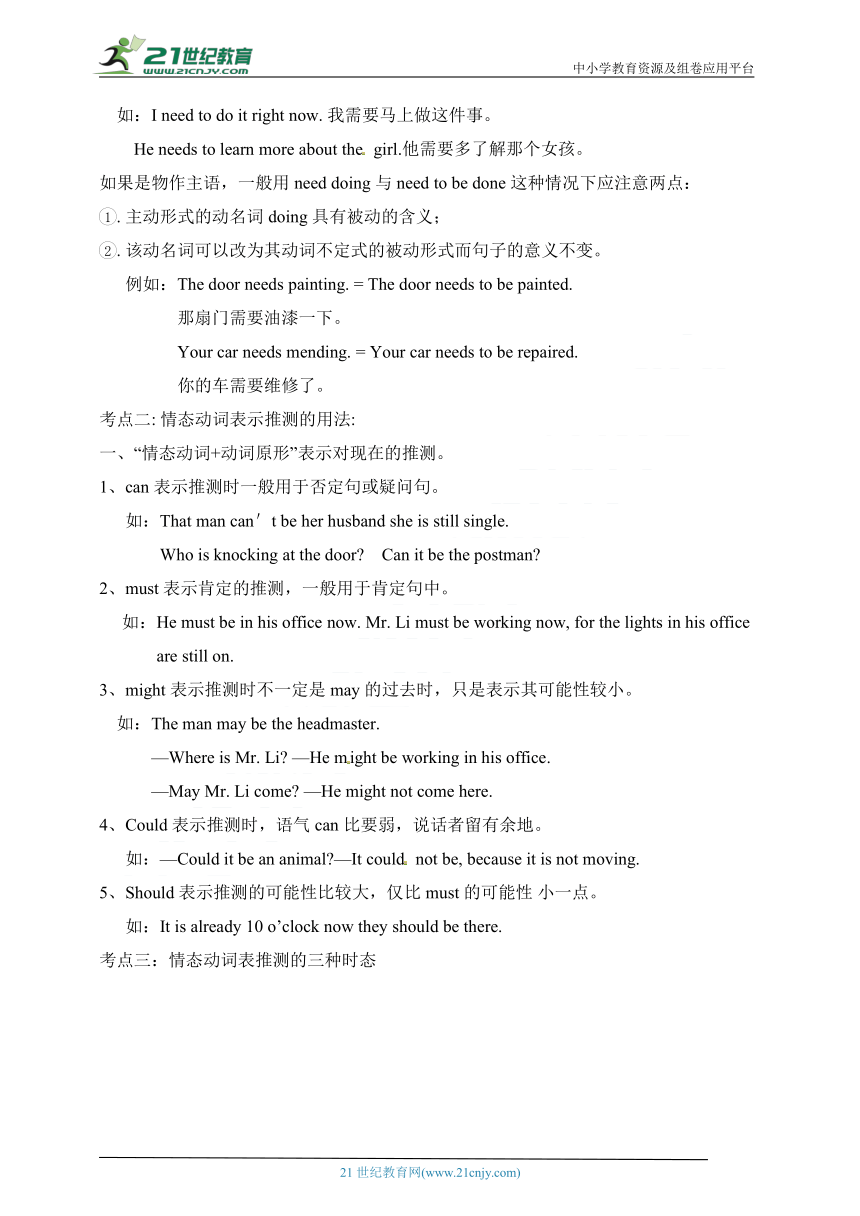
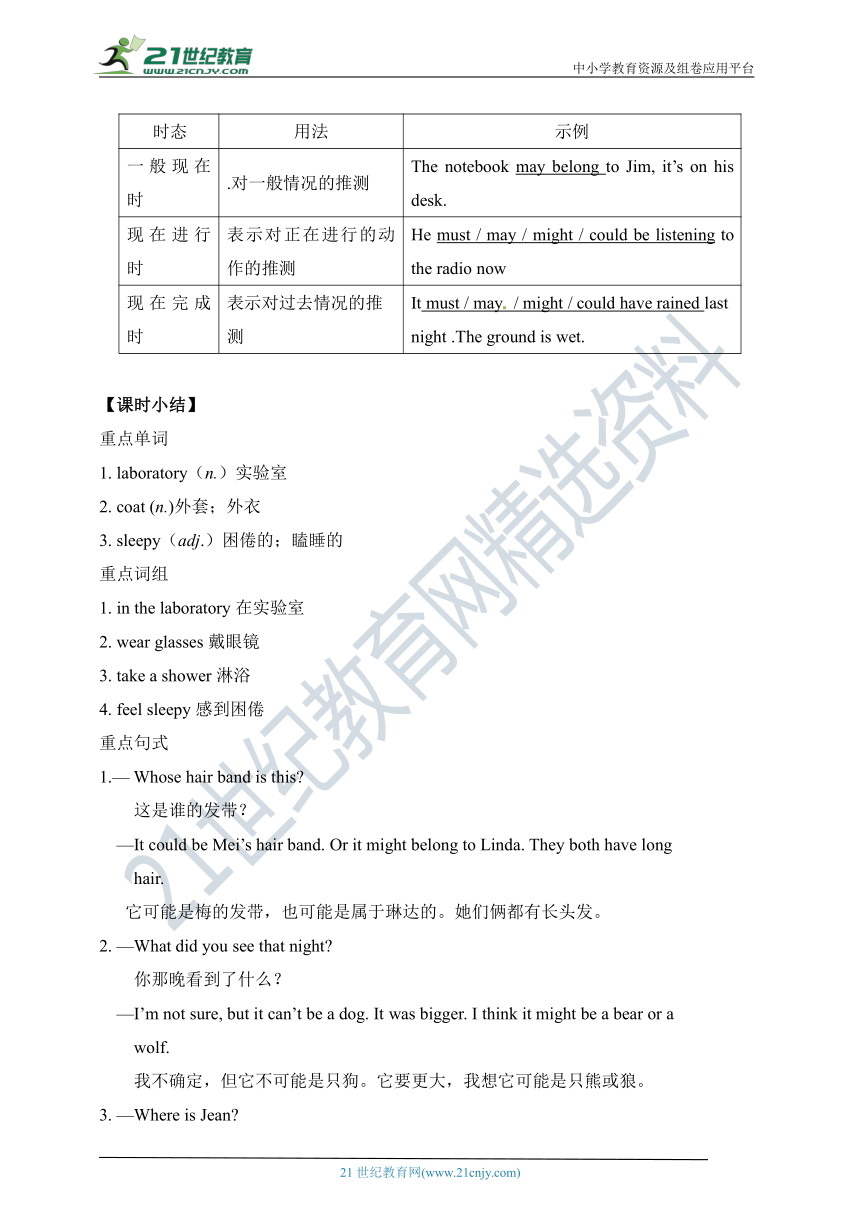
文档简介
Unit 8 It must belong to Carla
Section A3 (Grammar focus-4c)
【学习目标】
1.理解并熟练运用情态动词must,might,could和can't表示推测的用法和区别。
2.会运用上述单词和相关句型对事情进行合理推测。
3.通过交流和表达,进一步掌握本课所学的重点单词和短语。
4. 熟练运用语法要点中的句型和他人对话。
5. 通过本课的学习,养成根据事实推测的好习惯。
【重点和难点】
【学习重点】
情态动词表推测的用法和区别。
【学习难点】
情态动词表否定推测的用法和区别。
【课前预习】
一、根据句意及首字母提示完成句子。
1. I feel _____ in class today because I stayed up late watching the football match last night.
2. We have three chemistry _____ in our school.
3. You can put off your _____ in the room.It’s very warm here.
4. You’d better take a _____ before going to bed.
5. The machine is making too much _____ .Could you please turn it off?
二、根据课本内容完成下列句子。
1. 他可能是跑步锻炼身体。
2. 他可能是在跑着赶公共汽车。
3. 我肯定是在做梦。
4. 他可能上班迟到了。
【合作探究】
探究一、根据音标自学本课时的新单词,特别注意单词的词性、词义以及读音。
单词
词性
词义
单词
词性
词义
laboratory
outdoors
coat
sleepy
探究二、读一读Grammar Focus中的句子,自学情态动词的用法。
情态动词有具体的词义,但也同助动词一样,需要与其他词语一起构成句子的谓语,另外情态动词没有人称和数的变化,情态动词后必须跟动词原形。
考点一:can,may,must?等情态动词在陈述句中的用法:
1. can?的用法:
(1)表示能力、许可、可能性。?表示能力时一般译为“能、会”,?即有种能力, 尤其是生来具备的能力,此时may?和must均不可代替它。
如:She can swim fast, but I can’t.??她能游得很快,但我不能。
I can see with my eyes.?我用眼睛看。
(2)表示许可,常在口语中。
如:You can use my dictionary.???你可以用我的字典。
(3) 表示推测,意为“可能”,?常用于否定句和疑问句中,?此时can’t?译为“?不可能”。?
如:Can the news be true??这个消息会是真的吗?
—Can it be our teacher?那个人有可能是我们老师吗?
—No, it can’t be our teacher. He is on a visit to the Great Wall.
不可能。咱们老师正在游览长城呢。
2. could的用法:
(1)can的过去式,意为“?能、?会”,表示过去的能力。
如:He could write poems when he was 10.?? 他十岁时就会写诗。
(2)could在疑问句中,表示委婉的语气,此时?could?没有过去式的意思。
如: Could you do me a favor??你能帮我个忙吗?
—Could I use your pen??我能用一下你的钢笔吗??
—Yes, you can.可以。(注意回答)
3. may的用法:
(1)表示请求、许可,比can?正式.
如:May I borrow your bike??我可以借你的自行车吗?
You may go home now.?现在你可以回家了。
(2) 表示推测,谈论可能性,意为“?可能,?或许”,一般用于肯定句中。?
如:It may rain tomorrow.?明天可能会下雨。
She may be at home.?她可能在家呢.
?(3) may的过去式为might?,表示推测时。可能性低于may。?
如:He is away from school. He might be sick.他离开学校了,可能是他生病了。
?(4) 表示希望、祈求、祝愿,常可译为“祝愿”。通常是用may +主+V?
如:May you have a good time??祝你过得愉快。
May you be happy!?祝你幸福!?
May you succeed!祝你成功!
4. must的用法:
(1) must?表示主观看法,意为“必须、一定”。?
如:You must stay here until I come back.在我回来之前你必须呆在这儿。
Must I hand in my homework right now??我必须现在交作业吗?
(2)?其否定形式mustn’t表示“?一定不要?” “千万别” “禁止,?不许”.?
如:You mustn’t play with fire.??你不许玩火。
You mustn’t be late.?你一定不要迟到。
(3)对must引导的疑问句,肯定回答为must,否定回答为needn’t??或?don’t have to . 如:—Must I finish my homework? 我现在必须完成作业吗?
—No, you needn’t.不,你不必。
?(4) must表示有把握的推测,用于肯定句。
如: The light is on, so he must be at home now.灯亮着,他现在肯定在家。
5. need的用法:
(1)need?表示需要、必须,主要用于否定句和疑问句中,其否定形式为needn’t,意为“没有必要,不必”。?用need?提问时,肯定回答为?must,否定回答为?needn’t或don’t have to。?
如:—Need I stay here any longer???我还有必要留在这儿吗?
—Yes, you must .是的。
—No. you needn’t /don’t have to.?不,?你不必。
(2) need?还可以作实义动词,此时有人称、数和时态的变化,如果是人作主语后边多接动词不定式。
如:I need to do it right now.?我需要马上做这件事。
He needs to learn more about the girl.他需要多了解那个女孩。
如果是物作主语,一般用need doing?与?need to be done这种情况下应注意两点:
主动形式的动名词doing具有被动的含义;
该动名词可以改为其动词不定式的被动形式而句子的意义不变。
例如:The door needs painting. = The door needs to be painted.?
那扇门需要油漆一下。
Your car needs mending. = Your car needs to be repaired.
你的车需要维修了。
考点二:?情态动词表示推测的用法:
一、“情态动词+动词原形”表示对现在的推测。
1、can表示推测时一般用于否定句或疑问句。
如:That man can't be her husband she is still single.
Who is knocking at the door? Can it be the postman?
2、must表示肯定的推测,一般用于肯定句中。
如:He must be in his office now. Mr. Li must be working now, for the lights in his office are still on.
3、might?表示推测时不一定是may的过去时,只是表示其可能性较小。
如:The man may be the headmaster.
—Where is Mr. Li??—He might be working in his office.??
—May Mr. Li come??—He might not come here.
4、Could表示推测时,语气can比要弱,说话者留有余地。
如:—Could it be an animal?—It could not be, because it is not moving.
5、Should表示推测的可能性比较大,仅比must的可能性?小一点。
如:It is already 10 o’clock now they should be there.
考点三:情态动词表推测的三种时态
时态
用法
示例
一般现在时
.对一般情况的推测
The notebook may belong to Jim, it’s on his desk.
现在进行时
表示对正在进行的动作的推测
He must / may / might / could be listening to the radio now
现在完成时
表示对过去情况的推测
It must / may / might / could have rained last night .The ground is wet.
【课时小结】
重点单词
1. laboratory(n.)实验室
2. coat (n.)外套;外衣
3. sleepy(adj.)困倦的;瞌睡的
重点词组
1. in the laboratory在实验室
2. wear glasses戴眼镜
3. take a shower淋浴
4. feel sleepy感到困倦
重点句式
1.— Whose hair band is this?
这是谁的发带?
—It could be Mei’s hair band. Or it might belong to Linda. They both have long
hair.
它可能是梅的发带,也可能是属于琳达的。她们俩都有长头发。
2. —What did you see that night?
你那晚看到了什么?
—I’m not sure, but it can’t be a dog. It was bigger. I think it might be a bear or a
wolf.
我不确定,但它不可能是只狗。它要更大,我想它可能是只熊或狼。
3. —Where is Jean?
简在哪儿?
—I’m not sure. She might be in the laboratory.
我不知道。她可能在实验室。
—Every one is going to the pool after school.
大家放学后都将去游泳池。
—Really? It must be hot outdoor.
真的吗?室外一定很热。
5. —That’s the phone.电话响了。
—I wonder who it could be.我想知道会是谁。
6.—I wonder if these are Jim’s glasses.
我想知道这是否是吉姆的眼镜。
—They can’t be his. He doesn’t wear glasses.
它们不可能是他的,他从不戴眼镜。
【达标检测】
一. 用括号内所给单词的适当形式填空。
1. J.K. Rowling is her favorite (write).
2. I have nothing (value) in my schoolbag, so it can’t be (steal).
3. Our small town used to be very quiet, but something (usual) is happening these days. Everyone in our town is feeling (easy).
4. The noise-maker is having too much fun creating fear in the (neighbor).
5. I hear water (run) in the bathroom. Mom is taking a shower.
6. Many people are wearing (coat). The weather must be cold.
7. Whenever I try to read this boring book, I feel (sleep).
8. Tony and Jim are (policeman). They work in the same police station.
9. When we got there, several (wolf)were eating a dead sheep.
10. She promised me not to tell (somebody) about my secret.
11. Your brother (look like) your father. They both have a big nose.
12. It’s cold outside. Please put on a (coat).
二.选词填空。
1. A: Where’s Jean?
B: I’m not sure. She (is/ might be/ must be) in the laboratory.
2. A: Everyone is going to the pool after school.
B: Really? It (must be/ can’t be/ could be) hot outdoors.
3. A: That’s the phone.
B: Hmm. I wonder who it (must be/ could be/ should be).
4. A: I wonder if these are Jim’s glasses.
B: They (can’t be/ might be/ could be) his. He doesn’t wear glasses.
5. A: I hear water running in the bathroom.
B: It (could be/ must be/ can’t be) Carla. She was thinking of taking a
shower.
三. 单项选择。
( )1. —Who helped Betty tidy up the bedroom just now?
— . She cleaned it all by herself.
A. Somebody B. Nobody C. Everybody D. Anybody
( )2. Most British high school children uniforms at school.
A. put on B. dress C. wear D. dress up
( )3. —Why are you so tired these days?
—Well, I have homework to do.
A. too much B. too many C. much too D. many too
( )4. We went to the beach last Sunday, and we had great fun volleyball.
A. play B. playing C. played D. to play
( )5. The workers have to rubbish to keep the mountains clean.
A. turn up B. give up C. mix up D. pick up
( )6. Nowadays all passengers go through safety check before they
take a train.
A. can B. may C. must D. will
( )7. I thought you like something to eat, so I have brought you some delicious food.
A. may B. might C. can D. could
( )8. We had fun apples on the farm with the farmers last week.
A. to pick B. picking C. pick D. picked
( )9. The birds are making too much here. I can’t do anything.
A. sound B. voice C. noise D. shout
( )10. Don’t be about your mother. She is better now.
A. excited B. worry C. exciting D. worried
( )11. The old man can’t walk his leg was broken.
A. as if B. because of C. because D. as for
( )12. There must be in this small village.
A. valuable something B. something valuable
C. anything valuable D. valuable anything
四.用所给单词的适当形式填空,完成下列短文。(必要时可加助动词。)
People in the small town feel 1 (worry). The town 2 (use) to be very quiet. However, these days, something unusual is 3 (happen) in our town. Victor, a teacher, is really nervous. When he 4 (interview) by the town newspaper, he said that he 5 (hear) strange noises outside the window. His wife thought that it 6 (can) be an animal. But Victor and his friends thought it must be teenagers 7 (have) fun. One woman in the area saw something 8 (run) away, but it was dark, so she was not sure. Everyone in the small town is feeling uneasy, and everyone has his or her own ideas. There must be something 9 (visit) the homes in the neighborhood. What is it? People have no idea. Most people hope that this animal or person will simply go away. But the noise-maker is having too much fun 10 (create) fear in the neighborhood.
1. 2. 3. 4. 5.
6. 7. 8. 9. 10.
五. 完成句子。
1. 众所周知,钓鱼岛属于中国。
It is well known that Diaoyu Islands _________________ China.
2. 这个男孩正尽力地想赶上公共汽车。
They boy is _________________ the bus.
3. 我把它捡了起来,发现他是一个移动电话。
I ________________ and found it was a mobile phone.
4. 它一定是我们地理老师的。你看,他的名字在上面。
It ____________ our geography teacher’s. You see, his name is on it.
5. 有一些男孩在操场上踢足球。
___________ some boys ___________ on the playground.
6. 这个人一定在等什么人。
The man ________________ for somebody.
7.—I wonder if the homework is Mary’s.
—No, it _____________ (不可能是) hers. She wasn’t at school today.
8. The small town ___________ (过去曾经) very quiet.
9. The noise-maker is having too much fun ____________ (制造恐怖气氛) in the neighborhood.
【教师寄语】
【自我评价】
1. 本课我学会了什么?
_______________________________________________________
2. 通过本课的学习,我还有哪些疑问?
_____________________________________________________
参考答案:
【课前预习】
一、1. sleepy 2. laboratories 3. coat 4. shower 5. noise
二、1. He could be running for exercise.
2. He might be running to catch a bus to work.
3. I must be dreaming.
4. He might be late for work.
【合作探究】
探究一
单词
词性
词义
单词
词性
词义
laboratory
n
实验室
outdoors
adv
在户外
coat
n
外套
sleepy
adj
困倦的
【达标检测】
一 1. writer 2. valuable; stolen 3. unusual; uneasy 4. neighborhood
5. running 6. coats 7. sleepy 8. policemen 9. wolves
10. anybody 11. looks like 12. coat
二 1.might be 2. must be 3. could be 4. can’t be 5. could be/ must be
三 1-5 BCABD 6-10 CBBCD 11-12 CB
四 1. worried 2. used 3. happening 4. was interviewed 5. had heard
6. could 7. having 8. running 9. visiting 10. creating
五 1. belong to 2. trying to catch 3. picked it up 4. must be
5. There are; playing football 6. must be waiting 7. can’t be
8. used to be 9. creating fear
Section A3 (Grammar focus-4c)
【学习目标】
1.理解并熟练运用情态动词must,might,could和can't表示推测的用法和区别。
2.会运用上述单词和相关句型对事情进行合理推测。
3.通过交流和表达,进一步掌握本课所学的重点单词和短语。
4. 熟练运用语法要点中的句型和他人对话。
5. 通过本课的学习,养成根据事实推测的好习惯。
【重点和难点】
【学习重点】
情态动词表推测的用法和区别。
【学习难点】
情态动词表否定推测的用法和区别。
【课前预习】
一、根据句意及首字母提示完成句子。
1. I feel _____ in class today because I stayed up late watching the football match last night.
2. We have three chemistry _____ in our school.
3. You can put off your _____ in the room.It’s very warm here.
4. You’d better take a _____ before going to bed.
5. The machine is making too much _____ .Could you please turn it off?
二、根据课本内容完成下列句子。
1. 他可能是跑步锻炼身体。
2. 他可能是在跑着赶公共汽车。
3. 我肯定是在做梦。
4. 他可能上班迟到了。
【合作探究】
探究一、根据音标自学本课时的新单词,特别注意单词的词性、词义以及读音。
单词
词性
词义
单词
词性
词义
laboratory
outdoors
coat
sleepy
探究二、读一读Grammar Focus中的句子,自学情态动词的用法。
情态动词有具体的词义,但也同助动词一样,需要与其他词语一起构成句子的谓语,另外情态动词没有人称和数的变化,情态动词后必须跟动词原形。
考点一:can,may,must?等情态动词在陈述句中的用法:
1. can?的用法:
(1)表示能力、许可、可能性。?表示能力时一般译为“能、会”,?即有种能力, 尤其是生来具备的能力,此时may?和must均不可代替它。
如:She can swim fast, but I can’t.??她能游得很快,但我不能。
I can see with my eyes.?我用眼睛看。
(2)表示许可,常在口语中。
如:You can use my dictionary.???你可以用我的字典。
(3) 表示推测,意为“可能”,?常用于否定句和疑问句中,?此时can’t?译为“?不可能”。?
如:Can the news be true??这个消息会是真的吗?
—Can it be our teacher?那个人有可能是我们老师吗?
—No, it can’t be our teacher. He is on a visit to the Great Wall.
不可能。咱们老师正在游览长城呢。
2. could的用法:
(1)can的过去式,意为“?能、?会”,表示过去的能力。
如:He could write poems when he was 10.?? 他十岁时就会写诗。
(2)could在疑问句中,表示委婉的语气,此时?could?没有过去式的意思。
如: Could you do me a favor??你能帮我个忙吗?
—Could I use your pen??我能用一下你的钢笔吗??
—Yes, you can.可以。(注意回答)
3. may的用法:
(1)表示请求、许可,比can?正式.
如:May I borrow your bike??我可以借你的自行车吗?
You may go home now.?现在你可以回家了。
(2) 表示推测,谈论可能性,意为“?可能,?或许”,一般用于肯定句中。?
如:It may rain tomorrow.?明天可能会下雨。
She may be at home.?她可能在家呢.
?(3) may的过去式为might?,表示推测时。可能性低于may。?
如:He is away from school. He might be sick.他离开学校了,可能是他生病了。
?(4) 表示希望、祈求、祝愿,常可译为“祝愿”。通常是用may +主+V?
如:May you have a good time??祝你过得愉快。
May you be happy!?祝你幸福!?
May you succeed!祝你成功!
4. must的用法:
(1) must?表示主观看法,意为“必须、一定”。?
如:You must stay here until I come back.在我回来之前你必须呆在这儿。
Must I hand in my homework right now??我必须现在交作业吗?
(2)?其否定形式mustn’t表示“?一定不要?” “千万别” “禁止,?不许”.?
如:You mustn’t play with fire.??你不许玩火。
You mustn’t be late.?你一定不要迟到。
(3)对must引导的疑问句,肯定回答为must,否定回答为needn’t??或?don’t have to . 如:—Must I finish my homework? 我现在必须完成作业吗?
—No, you needn’t.不,你不必。
?(4) must表示有把握的推测,用于肯定句。
如: The light is on, so he must be at home now.灯亮着,他现在肯定在家。
5. need的用法:
(1)need?表示需要、必须,主要用于否定句和疑问句中,其否定形式为needn’t,意为“没有必要,不必”。?用need?提问时,肯定回答为?must,否定回答为?needn’t或don’t have to。?
如:—Need I stay here any longer???我还有必要留在这儿吗?
—Yes, you must .是的。
—No. you needn’t /don’t have to.?不,?你不必。
(2) need?还可以作实义动词,此时有人称、数和时态的变化,如果是人作主语后边多接动词不定式。
如:I need to do it right now.?我需要马上做这件事。
He needs to learn more about the girl.他需要多了解那个女孩。
如果是物作主语,一般用need doing?与?need to be done这种情况下应注意两点:
主动形式的动名词doing具有被动的含义;
该动名词可以改为其动词不定式的被动形式而句子的意义不变。
例如:The door needs painting. = The door needs to be painted.?
那扇门需要油漆一下。
Your car needs mending. = Your car needs to be repaired.
你的车需要维修了。
考点二:?情态动词表示推测的用法:
一、“情态动词+动词原形”表示对现在的推测。
1、can表示推测时一般用于否定句或疑问句。
如:That man can't be her husband she is still single.
Who is knocking at the door? Can it be the postman?
2、must表示肯定的推测,一般用于肯定句中。
如:He must be in his office now. Mr. Li must be working now, for the lights in his office are still on.
3、might?表示推测时不一定是may的过去时,只是表示其可能性较小。
如:The man may be the headmaster.
—Where is Mr. Li??—He might be working in his office.??
—May Mr. Li come??—He might not come here.
4、Could表示推测时,语气can比要弱,说话者留有余地。
如:—Could it be an animal?—It could not be, because it is not moving.
5、Should表示推测的可能性比较大,仅比must的可能性?小一点。
如:It is already 10 o’clock now they should be there.
考点三:情态动词表推测的三种时态
时态
用法
示例
一般现在时
.对一般情况的推测
The notebook may belong to Jim, it’s on his desk.
现在进行时
表示对正在进行的动作的推测
He must / may / might / could be listening to the radio now
现在完成时
表示对过去情况的推测
It must / may / might / could have rained last night .The ground is wet.
【课时小结】
重点单词
1. laboratory(n.)实验室
2. coat (n.)外套;外衣
3. sleepy(adj.)困倦的;瞌睡的
重点词组
1. in the laboratory在实验室
2. wear glasses戴眼镜
3. take a shower淋浴
4. feel sleepy感到困倦
重点句式
1.— Whose hair band is this?
这是谁的发带?
—It could be Mei’s hair band. Or it might belong to Linda. They both have long
hair.
它可能是梅的发带,也可能是属于琳达的。她们俩都有长头发。
2. —What did you see that night?
你那晚看到了什么?
—I’m not sure, but it can’t be a dog. It was bigger. I think it might be a bear or a
wolf.
我不确定,但它不可能是只狗。它要更大,我想它可能是只熊或狼。
3. —Where is Jean?
简在哪儿?
—I’m not sure. She might be in the laboratory.
我不知道。她可能在实验室。
—Every one is going to the pool after school.
大家放学后都将去游泳池。
—Really? It must be hot outdoor.
真的吗?室外一定很热。
5. —That’s the phone.电话响了。
—I wonder who it could be.我想知道会是谁。
6.—I wonder if these are Jim’s glasses.
我想知道这是否是吉姆的眼镜。
—They can’t be his. He doesn’t wear glasses.
它们不可能是他的,他从不戴眼镜。
【达标检测】
一. 用括号内所给单词的适当形式填空。
1. J.K. Rowling is her favorite (write).
2. I have nothing (value) in my schoolbag, so it can’t be (steal).
3. Our small town used to be very quiet, but something (usual) is happening these days. Everyone in our town is feeling (easy).
4. The noise-maker is having too much fun creating fear in the (neighbor).
5. I hear water (run) in the bathroom. Mom is taking a shower.
6. Many people are wearing (coat). The weather must be cold.
7. Whenever I try to read this boring book, I feel (sleep).
8. Tony and Jim are (policeman). They work in the same police station.
9. When we got there, several (wolf)were eating a dead sheep.
10. She promised me not to tell (somebody) about my secret.
11. Your brother (look like) your father. They both have a big nose.
12. It’s cold outside. Please put on a (coat).
二.选词填空。
1. A: Where’s Jean?
B: I’m not sure. She (is/ might be/ must be) in the laboratory.
2. A: Everyone is going to the pool after school.
B: Really? It (must be/ can’t be/ could be) hot outdoors.
3. A: That’s the phone.
B: Hmm. I wonder who it (must be/ could be/ should be).
4. A: I wonder if these are Jim’s glasses.
B: They (can’t be/ might be/ could be) his. He doesn’t wear glasses.
5. A: I hear water running in the bathroom.
B: It (could be/ must be/ can’t be) Carla. She was thinking of taking a
shower.
三. 单项选择。
( )1. —Who helped Betty tidy up the bedroom just now?
— . She cleaned it all by herself.
A. Somebody B. Nobody C. Everybody D. Anybody
( )2. Most British high school children uniforms at school.
A. put on B. dress C. wear D. dress up
( )3. —Why are you so tired these days?
—Well, I have homework to do.
A. too much B. too many C. much too D. many too
( )4. We went to the beach last Sunday, and we had great fun volleyball.
A. play B. playing C. played D. to play
( )5. The workers have to rubbish to keep the mountains clean.
A. turn up B. give up C. mix up D. pick up
( )6. Nowadays all passengers go through safety check before they
take a train.
A. can B. may C. must D. will
( )7. I thought you like something to eat, so I have brought you some delicious food.
A. may B. might C. can D. could
( )8. We had fun apples on the farm with the farmers last week.
A. to pick B. picking C. pick D. picked
( )9. The birds are making too much here. I can’t do anything.
A. sound B. voice C. noise D. shout
( )10. Don’t be about your mother. She is better now.
A. excited B. worry C. exciting D. worried
( )11. The old man can’t walk his leg was broken.
A. as if B. because of C. because D. as for
( )12. There must be in this small village.
A. valuable something B. something valuable
C. anything valuable D. valuable anything
四.用所给单词的适当形式填空,完成下列短文。(必要时可加助动词。)
People in the small town feel 1 (worry). The town 2 (use) to be very quiet. However, these days, something unusual is 3 (happen) in our town. Victor, a teacher, is really nervous. When he 4 (interview) by the town newspaper, he said that he 5 (hear) strange noises outside the window. His wife thought that it 6 (can) be an animal. But Victor and his friends thought it must be teenagers 7 (have) fun. One woman in the area saw something 8 (run) away, but it was dark, so she was not sure. Everyone in the small town is feeling uneasy, and everyone has his or her own ideas. There must be something 9 (visit) the homes in the neighborhood. What is it? People have no idea. Most people hope that this animal or person will simply go away. But the noise-maker is having too much fun 10 (create) fear in the neighborhood.
1. 2. 3. 4. 5.
6. 7. 8. 9. 10.
五. 完成句子。
1. 众所周知,钓鱼岛属于中国。
It is well known that Diaoyu Islands _________________ China.
2. 这个男孩正尽力地想赶上公共汽车。
They boy is _________________ the bus.
3. 我把它捡了起来,发现他是一个移动电话。
I ________________ and found it was a mobile phone.
4. 它一定是我们地理老师的。你看,他的名字在上面。
It ____________ our geography teacher’s. You see, his name is on it.
5. 有一些男孩在操场上踢足球。
___________ some boys ___________ on the playground.
6. 这个人一定在等什么人。
The man ________________ for somebody.
7.—I wonder if the homework is Mary’s.
—No, it _____________ (不可能是) hers. She wasn’t at school today.
8. The small town ___________ (过去曾经) very quiet.
9. The noise-maker is having too much fun ____________ (制造恐怖气氛) in the neighborhood.
【教师寄语】
【自我评价】
1. 本课我学会了什么?
_______________________________________________________
2. 通过本课的学习,我还有哪些疑问?
_____________________________________________________
参考答案:
【课前预习】
一、1. sleepy 2. laboratories 3. coat 4. shower 5. noise
二、1. He could be running for exercise.
2. He might be running to catch a bus to work.
3. I must be dreaming.
4. He might be late for work.
【合作探究】
探究一
单词
词性
词义
单词
词性
词义
laboratory
n
实验室
outdoors
adv
在户外
coat
n
外套
sleepy
adj
困倦的
【达标检测】
一 1. writer 2. valuable; stolen 3. unusual; uneasy 4. neighborhood
5. running 6. coats 7. sleepy 8. policemen 9. wolves
10. anybody 11. looks like 12. coat
二 1.might be 2. must be 3. could be 4. can’t be 5. could be/ must be
三 1-5 BCABD 6-10 CBBCD 11-12 CB
四 1. worried 2. used 3. happening 4. was interviewed 5. had heard
6. could 7. having 8. running 9. visiting 10. creating
五 1. belong to 2. trying to catch 3. picked it up 4. must be
5. There are; playing football 6. must be waiting 7. can’t be
8. used to be 9. creating fear
同课章节目录
- Unit 1 How can we become good learners.
- Section A
- Section B
- Unit 2 I think that mooncakes are delicious!
- Section A
- Section B
- Unit 3 Could you please tell me where the restroom
- Section A
- Section B
- Unit 4 I used to be afraid of the dark.
- Section A
- Section B
- Unit 5 What are the shirts made of?
- Section A
- Section B
- Review of Units 1-5
- Unit 6 When was it invented?
- Section A
- Section B
- Unit 7 Teenagers should be allowed to choose their
- Section A
- Section B
- Unit 8 It must belong to Carla.
- Section A
- Section B
- Unit 9 I like music that I can dance to.
- Section A
- Section B
- Unit 10 You're supposed to shake hands.
- Section A
- Section B
- Review of Units 6-10
- Unit 11 Sad movies make me cry.
- Section A
- Section B
- Unit 12 Life is full of the unexpected
- Section A
- Section B
- Unit 13 We're trying to save the earth!
- Section A
- Section B
- Unit 14 I remember meeting all of you in Grade 7.
- Section A
- Section B
- Review of Units 11-14
